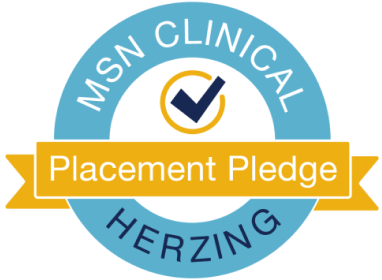Pathways
Advance your career to Psychiatric Mental Health Nurse Practitioner (PMHNP)
No matter where you are in your nursing career, Herzing University offers unique MSN and DNP educational pathways for you to advance towards becoming a psychiatric mental health nurse practitioner.

MSN-PMHNP
Go from BSN to PMHNP
- Program length: 24 months
- Classes: View the curriculum
- Enrollment: View the admissions requirements

Accelerated MSN-PMHNP
Go from RN/ADN to PMHNP
- Program length: 28 months
- Classes: View the curriculum
- Enrollment: View the admissions requirements

Post Master's PMHNP
Go from MSN to PMHNP
- Program length: 20 months
- Classes: View the curriculum
- Enrollment: View the admissions requirements

BSN to DNP-PMHNP
Go from BSN to DNP-PMHNP
- Program length: 32 months
- Classes: View the curriculum
- Enrollment: View the admissions requirements

MSN to DNP-PMHNP
Go from MSN to DNP-PMHNP
- Program length: 24 months
- Classes: View the curriculum
- Enrollment: View the admissions requirements
Herzing University’s online PMHNP program pathways
| Accreditation | CCNE accredited,1 Accredited by the Higher Learning Commission |
|---|---|
| Program length | 20-32 months, depending on degree choice |
| Options | Options for nurses who hold an ADN/ASN, BSN, or MSN degree |
| Paying for school | Scholarships and financial aid available for those who qualify; transfer credit from prior college coursework to reduce cost and time |
| Clinicals | We pledge your clinical placement |
| Format | Flexible online study with multiple start dates |
| QuickPaths | Transfer credit, stackable credentials, and adaptive learning technology build a faster pathway to a higher education with Herzing University |
Learn More Today!

Ranked by U.S. News & World Report as one of the best online graduate nursing programs in 2025

Your Clinical Placement is Our Pledge
We understand securing clinical placement as part of an MSN degree program is one of the biggest concerns students face. At Herzing, we offer guidance and support through our step-by-step Clinical Guidance Process to ensure you can get the clinical practice experiences you need. As a Herzing student, we’ll encourage you to find your own preceptor and clinical sites as there are many benefits to doing so. However, we provide extensive support should you find difficulty along the way. With Herzing, you are never on your own. Because of our strong relationships with healthcare providers across the U.S. and our comprehensive Clinical Guidance Process, we are confident in our ability to help you find clinical placement. So much so that if you are unable to find a clinical site on your own, we pledge to step in and help you secure clinical placement.*
*Subject to terms and conditions outlined in the enrollment documents.
Tuition & Cost
Tuition & Cost
Our goal is your career advancement. That’s why we are always working to improve our curriculums and processes to make our nurse practitioner programs as affordable as possible while preparing you best for success in your work.
Overall cost can be reduced through transfer credit from prior college coursework, scholarships and grants, loans, VA and military benefits, and several additional options for financial aid.
With Herzing University, you are never alone, and we offer many options to help you invest in yourself, earn your master’s degree in nursing and become a PMHNP.
Scholarship Opportunities
We are proud to have awarded $13+ million in scholarships and grants to nursing students in 2024.
An affordable, career-focused education is possible with Herzing University.
Here to Serve You
Pathways to Success
Many of our online programs offer pathways for continued learning, which allow you to move from one degree, such as an associate degree, to a bachelor’s degree, to a master’s degree.
Flexible and Convenient
Earn your degree from the comfort of your own home. There are no designated times you must be online. You can log into your virtual classroom when it’s convenient for you.
Personalized Attention
At Herzing, being online does not mean being alone.You’ll receive the same personalized attention and career-focused education that we offer in our traditional classroom.
Online and/or On-Campus
Get the best of both worlds. Some of our degree programs are offered exclusively online and some programs are offered as a combination of both campus and online classes.
I don’t have a nursing degree. Where do I start?
If you have already earned a non-nursing bachelor’s degree, there are two potential educational pathways in nursing we’ve designed with you in mind:
- Accelerated BSN (ABSN) program. Our on-campus ABSN program, available at select Herzing campuses, allows you to earn a Bachelor of Science in Nursing (BSN) in as few as 20 months (most students complete in 24 months).
- MSN Direct Entry program. Start working towards a Master of Science in Nursing (MSN) right from the start in our online direct entry MSN program. You can graduate in as few as 20 months.
If you have not yet earned an undergraduate degree in any major, you will need to first earn an Associate of Science in Nursing (ASN) or BSN.
Once you’ve earned an undergraduate nursing degree, you can become eligible to enroll in an MSN, post master’s certificate, or BSN to DNP program with a PMHNP specialization.
Meet Our Leadership

"Becoming a PMHNP has been one of the best decisions I’ve ever made.
I’ve spent countless hours sitting with patients and their families, providing supportive therapy and compassionate care. As nurses, we develop a deep understanding of our patients’ social and economic challenges, and we are natural advocates on their behalf. Now, as a psychiatric-mental health nurse practitioner, I’m able to take that advocacy a step further.
With the growing demand for mental health providers, nurse practitioners are stepping to the forefront—equipped with the knowledge, empathy, and clinical skills to meet our patients' psychiatric needs. It’s an incredibly rewarding and impactful role."
Dr. Monique Scott DNP, PMHNP-BC
Program Chair - Psychiatric Nurse PractitionerDr. Monique Scott is a Board-certified Psychiatric Nurse Practitioner with over 18 years of combined nursing and advanced practice experience, specializing in child and adolescent psychiatry, chronic mental health disorders, and geriatric psychiatry. She serves as the Program Chair for Herzing University’s PMHNP program, bringing a passion for mentorship and community-based mental health education. An alumna of New York University and Wilkes University, Dr. Scott is committed to preparing future nurse practitioners to provide compassionate, evidence-based care to diverse populations.
Faq
Frequently Asked Questions
Didn't find the answer to your question? Send us an inquiry and we will be happy to answer all your questions!
According to the Bureau of Labor Statistics, nurse practitioners earn an average salary of $132,000 per year ($63.46 per hour).*
NPs specializing in psychiatry/mental health may increase their earning potential by becoming board certified, gaining valuable experience and continuing their education.
Learn more about how much NPs can make, including a state-by-state breakdown and estimates across several unique healthcare facilities.
Here’s a selection of the most common types of nurse practitioners:
- Family Nurse Practitioner (FNP)
- Adult Gerontology Acute Care Nurse Practitioner (AGACNP)
- Adult Gerontology Primary Care Nurse Practitioner (AGPCNP)
- Pediatric Nurse Practitioner (PNP)
- Psychiatric Mental Health Nurse Practitioner (PMHNP)
- Women’s Health Nurse Practitioner (WHNP)
Each specialty has its own unique requirements in terms of job experience and certification.
The role of a PMHNP can overlap with psychiatrists, psychologists, social workers and other healthcare professionals who routinely perform psychotherapy. However, the total scope of practice for each role is different and varies by state requirements.
Psychiatric-mental health nurse practitioners hold a master’s degree or doctorate in nursing, while a psychiatrist is a physician who went to medical school and completed a residency program specializing in psychiatry.
PMNHPs can do many things a psychiatrist does, including psychotherapy, prescribing medications, developing and managing treatment plans and educating patients and their families.
Psychiatrists are typically able to treat more complex types of disorders, but PMNHPs may treat many common disorders like anxiety, depression, Attention Deficit Disorder (ADD), Schizophrenia, substance abuse/addiction, and much more.
Sometimes hospitals form partnerships with schools like ours to provide employees with unique benefits should they choose to pursue an advanced nursing degree.
Employees of Herzing partners can potentially earn college credit for prior work or military experience, transfer existing credit, or earn a scholarship to make going back to school more affordable.
If you are currently an RN considering becoming a nurse practitioner, view our educational partnerships or check with your employer for potential possibilities.
Both of those common types of nurse practitioner specialties are highly rewarding and represent a big step forward for a registered nurse looking to advance their career.
- Choose Psychiatric-Mental Health Nurse Practitioner (PMHNP) if…you want to be a true psychiatric/mental health specialist, and enjoy giving a voice to patients who are too often misunderstood. An excellent pathway for nurses who have gained practical experience behavioral health or worked in a community mental health facility and want to continue in the psychiatric field.
- Choose Family Nurse Practitioner (FNP) if…you want to specialize in the broader field of family practice across the lifespan and prefer a hands-on approach to patient care. You may pursue many different specialties in neonatal (NICU), pediatric or geriatric care. As an FNP you’ll have a strong educational foundation to pursue your unique career path in family practice. Learn more about the Herzing University MSN – Family Nurse Practitioner program.
Learn more about the biggest differences between FNP vs. PMHNP.
No. To become a nurse practitioner, you will need to earn a Master of Science in Nursing (MSN) or Doctor of Nursing Practice (DNP) degree.
While we do not currently offer a single dedicated program for those looking to go from non-nurse to nurse practitioner, we do offer several online nursing programs for non-nurses with eligibility in several U.S. states.
This depends on the state in which you practice. Qualifying for NP school is not the same as qualifying for NP jobs. You may not need to be a Registered Nurse (RN) to qualify for an NP degree program, but some employers may require a minimum amount of RN experience from NP job applicants.
It can take roughly 3-5 years to go from non-nurse to NP through our program options but it depends on what education you’ve already earned and how quickly you want to progress.
There is a difference between being licensed and certified. Becoming a certified PMHNP shows employers you are capable of patient care in a psychiatric setting. Licensure determines if you are legally allowed to practice in your state of residence. Employers may require board certification before hiring a PMHNP even if practicing without certification is legally permissible.
Each state has their own requirements for licensure. You will need to find the requirements from your state’s board of nursing.
We strongly recommend getting certified after graduating with your degree. You’ll be in the best position to find a great job and follow your career path in nursing.
Accreditation & Disclosures
1. The master’s degree program in nursing, doctor of nursing practice program, and post-graduate APRN certificate program at Herzing University Madison are accredited by the Commission on Collegiate Nursing Education (http://www.ccneaccreditation.org). Herzing University is approved to offer programs in an online learning modality through association with the main campus in Madison, Wisconsin.
* BLS pay estimates calculate the median annual wage for various occupations. Per the BLS the median wage for an occupation is: "The wage at which half of the workers in the occupation earned more than that amount, and half earned less. Median wage data are from the BLS Occupational Employment and Wage Statistics survey." Bureau of Labor Statistics (BLS), U.S. Department of Labor, Occupational Outlook Handbook 2024. BLS median wage estimates do not represent entry-level wages and/or salaries. Multiple factors, including prior experience, age, geographic market in which you want to work, and degree level and field, will affect career outcomes, including starting salary and earnings as an experienced employee. Herzing neither represents that its graduates will earn the median salaries calculated by BLS for a particular job nor guarantees that graduation from its program will result in a job, promotion, particular wage or salary, or other career growth.







